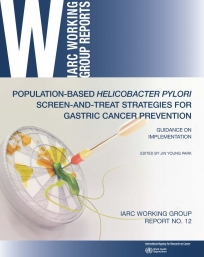
978-92-832-4528-5
As part of the Accelerating Gastric Cancer Reduction in Europe through Helicobacter pylori Eradication (EUROHELICAN) project, the International Agency for Research on Cancer (IARC) convened a Working Group of international, interdisciplinary experts in February 2025 to discuss best practices in the implementation of population-based H. pylori screen-and-treat strategies for adult populations for gastric cancer prevention.
The scope of the Working Group Meeting and this Working Group Report is not limited to Europe but covers all world regions, including various levels of the Human Development Index and background burdens of disease, to ensure that the guidance is globally applicable.
This publication describes the global epidemiology of gastric cancer and H. pylori infection and provides summaries of the scientific evidence on the effect of population-based H. pylori screen-and-treat strategies for gastric cancer prevention and the currently available guidelines and recommendations on the strategies. The report presents various gastric cancer prevention efforts for each World Health Organization (WHO) region, highlights the gaps in knowledge and the future efforts that are needed, and details programmatic aspects of the strategies for implementation at the population level. The report also covers a range of key considerations for implementation of the strategies, including needs and readiness assessments, choosing screening methods and treatment regimens, antibiotic stewardship, process and outcome measures for improving quality and equity, and the cost–benefits of the strategies.
In addition to gastric cancer prevention, the implementation of population-based H. pylori screen-and-treat strategies will have benefits in reducing the prevalence of other important clinical conditions. It also provides a key opportunity to address the inequalities associated with gastric cancer worldwide.
Acknowledgements and Disclaimer
Chapter 3. Examples of gastric cancer prevention efforts by World Health Organization region
Chapter 3.1. Gastric cancer in Africa, with a focus on Nigeria and Zambia
Chapter 3.2. Gastric cancer prevention in Latin America and the Caribbean
Chapter 3.3. Gastric cancer prevention research in the USA
Chapter 3.4. Gastric cancer prevention in Arctic North America (Alaska, Canada, and Greenland)
Chapter 3.5. Gastric cancer prevention efforts in Europe (EUROHELICAN, TOGAS, and HPSS projects)
Chapter 3.6. Gastric cancer prevention programme in Bhutan
Chapter 3.7. Gastric cancer prevention in China
Chapter 3.8. Gastric cancer prevention in Japan
Chapter 3.9. Gastric cancer prevention in the Republic of Korea
Chapter 5. Considerations for choice of population-based Helicobacter pylori detection methods
Chapter 6. Considerations for choice of Helicobacter pylori treatment regimens